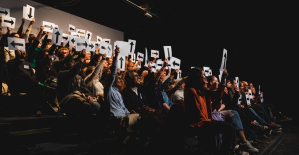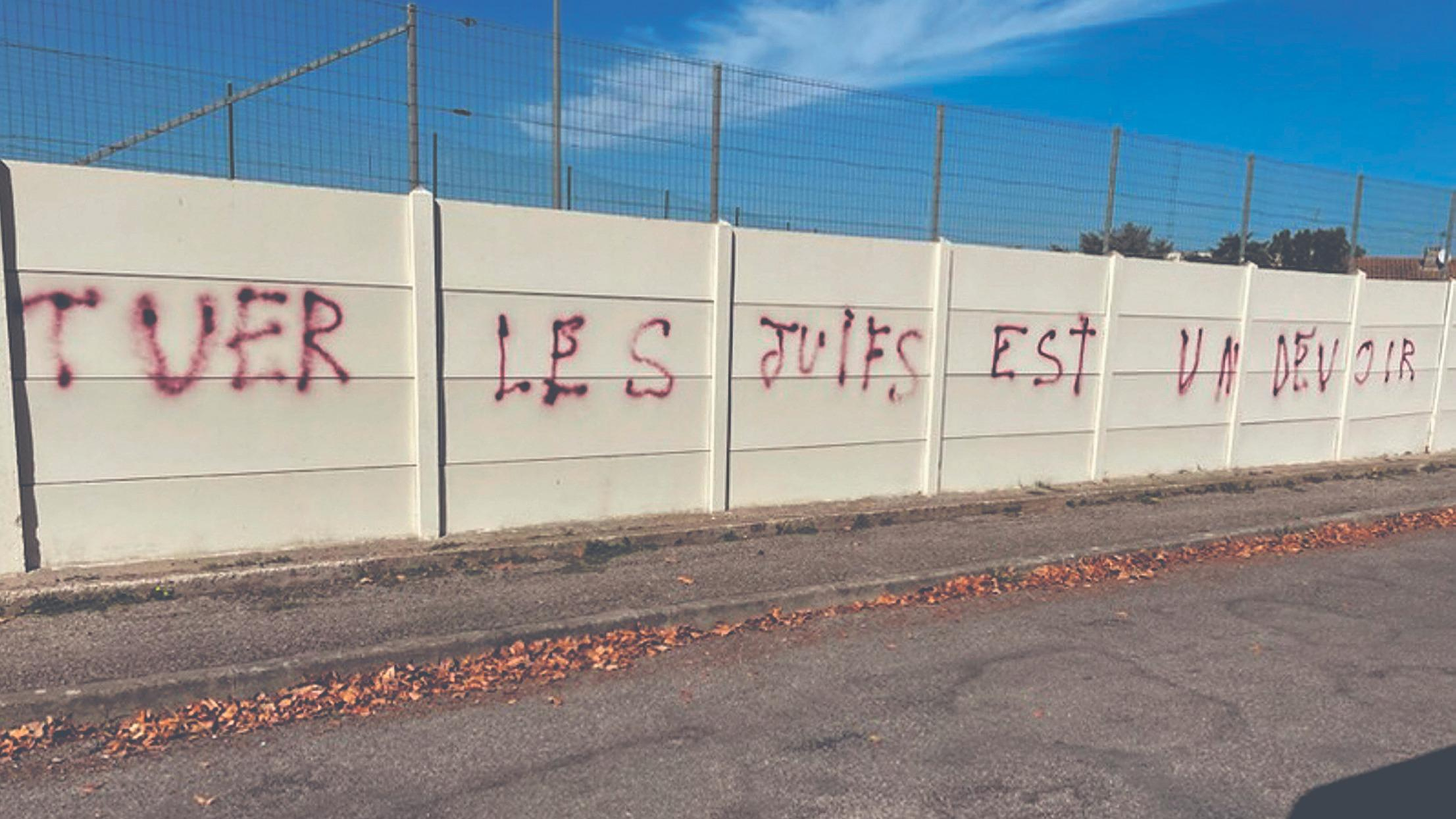A few days after the violent attack on Friday of a sixty-year-old man leaving a synagogue in the 20th arrondissement of Paris, a bill aimed at toughening sanctions against racist and anti-Semitic insults is being examined this Tuesday in the National Assembly . Denialist remarks are in the viewfinder of this text carried by the deputy (Renaissance) Mathieu Lefèvre, who also attacks non-public offenses “for example committed in business, in the public service or a WhatsApp group”. “The criminal response must be relentless while anti-Semitic speech has been released,” explains the elected official to Le Figaro.
This proposed law comes against a backdrop of an increase in anti-Semitic acts, observed since the start of the conflict between Hamas and Israel in early October. 1,669 incidents were recorded in 2023, according to figures communicated to Le Figaro by the Ministry of the Interior, confirming a count established by Crif at the end of January. This represents an “unparalleled” increase of 284% compared to the previous year, detailed Gérald Darmanin during a Senate hearing on Tuesday February 27. For the start of 2024, these acts will experience a “relative decline”, assured the Minister of the Interior without further details.
Article 1 of the text would allow a court to issue an arrest or committal warrant against anyone who is guilty of a serious offense of an anti-Semitic, racist or discriminatory nature. Today, this possibility is reserved for common law or military offenses (article 465 of the Code of Criminal Procedure) while offenses of condoning crimes against humanity or negationism, which are neither part of neither of them are punishable by the law of July 29, 1881 on freedom of the press with one year's imprisonment and a fine of 45,000 euros.
In the same spirit, article two converts into offenses the contraventions provided for punishing non-public insult and provocation to discrimination as well as non-public defamation of a racist nature. An amendment tabled by Nupes requests the deletion of this article, arguing that “the dissuasive nature of the severity of the sentences has never been demonstrated” and instead proposing “citizenship courses (…) to avoid recidivism”.
“Faced with racism, the criminal response cannot do everything, it is also a matter of education,” admits Mathieu Lefèvre. Now, one doesn't go without the other. Obviously we need an educational response, but the penal response seems essential to me and it is always dissuasive.” Article 3, finally, creates an offense of non-public apology or contestation of crimes against humanity.
“Atmospheric anti-Semitism”, as the tenant of Place Beauvau describes it in reference to “atmospheric jihadism” theorized by Islamologist Gilles Kepel, has also spilled over onto the Internet. The Pharos platform, which allows illicit content to be reported online, received, last year, “more than 12,000 reports linked to the conflict” between the Jewish state and the terrorist group in control of the Gaza Strip. added the Minister of the Interior. And to point out the role of social networks, in particular X (formerly Twitter) which concentrated “75% of apologetic or anti-Semitic content”. “We must adapt to the strategies of hate preachers who use the flaws of social networks,” explains Mathieu Lefèvre, specifying that his text does not attack the regulation of web giants. In 2023, hostile actions also targeted Christians and anti-Muslim acts increased by 29% compared to 2022.
The text, resulting from the plan to combat racism and anti-Semitism presented by Élisabeth Borne in 2023, has, according to the MP, a strong chance of being adopted. “The two opposition Republican parties, the Socialist Party and The Republicans, voted favorably in committee. Insoumise France is against it,” he explains. What about the National Rally? “It’s not a Republican party, I don’t know what they will do,” assures the elected official.

 B:SM will break its investment record this year with 62 million euros
B:SM will break its investment record this year with 62 million euros War in Ukraine: when kyiv attacks Russia with inflatable balloons loaded with explosives
War in Ukraine: when kyiv attacks Russia with inflatable balloons loaded with explosives United States: divided on the question of presidential immunity, the Supreme Court offers respite to Trump
United States: divided on the question of presidential immunity, the Supreme Court offers respite to Trump Maurizio Molinari: “the Scurati affair, a European injury”
Maurizio Molinari: “the Scurati affair, a European injury” First three cases of “native” cholera confirmed in Mayotte
First three cases of “native” cholera confirmed in Mayotte Meningitis: compulsory vaccination for babies will be extended in 2025
Meningitis: compulsory vaccination for babies will be extended in 2025 Spain is the country in the European Union with the most overqualified workers for their jobs
Spain is the country in the European Union with the most overqualified workers for their jobs Parvovirus alert, the “fifth disease” of children which has already caused the death of five babies in 2024
Parvovirus alert, the “fifth disease” of children which has already caused the death of five babies in 2024 The A13 motorway will not reopen on May 1
The A13 motorway will not reopen on May 1 More than 1,500 items for less than 1 euro: the Dutch discounter Action opens a third store in Paris
More than 1,500 items for less than 1 euro: the Dutch discounter Action opens a third store in Paris 100 million euros in loans, water storage, Ecophyto plan… New measures from the executive towards farmers
100 million euros in loans, water storage, Ecophyto plan… New measures from the executive towards farmers “He is greatly responsible”: Philippe Martinez accuses Emmanuel Macron of having raised the RN
“He is greatly responsible”: Philippe Martinez accuses Emmanuel Macron of having raised the RN Les Galons de la BD dedicates War Photographers, a virtuoso album on the Spanish War
Les Galons de la BD dedicates War Photographers, a virtuoso album on the Spanish War Theater: Kevin, or the example of an academic failure
Theater: Kevin, or the example of an academic failure The eye of the INA: Jean Carmet, the thirst for life of a great actor
The eye of the INA: Jean Carmet, the thirst for life of a great actor The Nuc plus ultra: St Vincent the Texane and Neil Young the return
The Nuc plus ultra: St Vincent the Texane and Neil Young the return Skoda Kodiaq 2024: a 'beast' plug-in hybrid SUV
Skoda Kodiaq 2024: a 'beast' plug-in hybrid SUV Tesla launches a new Model Y with 600 km of autonomy at a "more accessible price"
Tesla launches a new Model Y with 600 km of autonomy at a "more accessible price" The 10 best-selling cars in March 2024 in Spain: sales fall due to Easter
The 10 best-selling cars in March 2024 in Spain: sales fall due to Easter A private jet company buys more than 100 flying cars
A private jet company buys more than 100 flying cars This is how housing prices have changed in Spain in the last decade
This is how housing prices have changed in Spain in the last decade The home mortgage firm drops 10% in January and interest soars to 3.46%
The home mortgage firm drops 10% in January and interest soars to 3.46% The jewel of the Rocío de Nagüeles urbanization: a dream villa in Marbella
The jewel of the Rocío de Nagüeles urbanization: a dream villa in Marbella Rental prices grow by 7.3% in February: where does it go up and where does it go down?
Rental prices grow by 7.3% in February: where does it go up and where does it go down? Even on a mission for NATO, the Charles-de-Gaulle remains under French control, Lecornu responds to Mélenchon
Even on a mission for NATO, the Charles-de-Gaulle remains under French control, Lecornu responds to Mélenchon “Deadly Europe”, “economic decline”, immigration… What to remember from Emmanuel Macron’s speech at the Sorbonne
“Deadly Europe”, “economic decline”, immigration… What to remember from Emmanuel Macron’s speech at the Sorbonne Sale of Biogaran: The Republicans write to Emmanuel Macron
Sale of Biogaran: The Republicans write to Emmanuel Macron Europeans: “All those who claim that we don’t need Europe are liars”, criticizes Bayrou
Europeans: “All those who claim that we don’t need Europe are liars”, criticizes Bayrou These French cities that will boycott the World Cup in Qatar
These French cities that will boycott the World Cup in Qatar Paris 2024 Olympic Games: “It’s up to us to continue to honor what the Games are,” announces Estanguet
Paris 2024 Olympic Games: “It’s up to us to continue to honor what the Games are,” announces Estanguet MotoGP: Marc Marquez takes pole position in Spain
MotoGP: Marc Marquez takes pole position in Spain Ligue 1: Brest wants to play the European Cup at the Stade Francis-Le Blé
Ligue 1: Brest wants to play the European Cup at the Stade Francis-Le Blé Tennis: Tsitsipas released as soon as he entered the competition in Madrid
Tennis: Tsitsipas released as soon as he entered the competition in Madrid


















